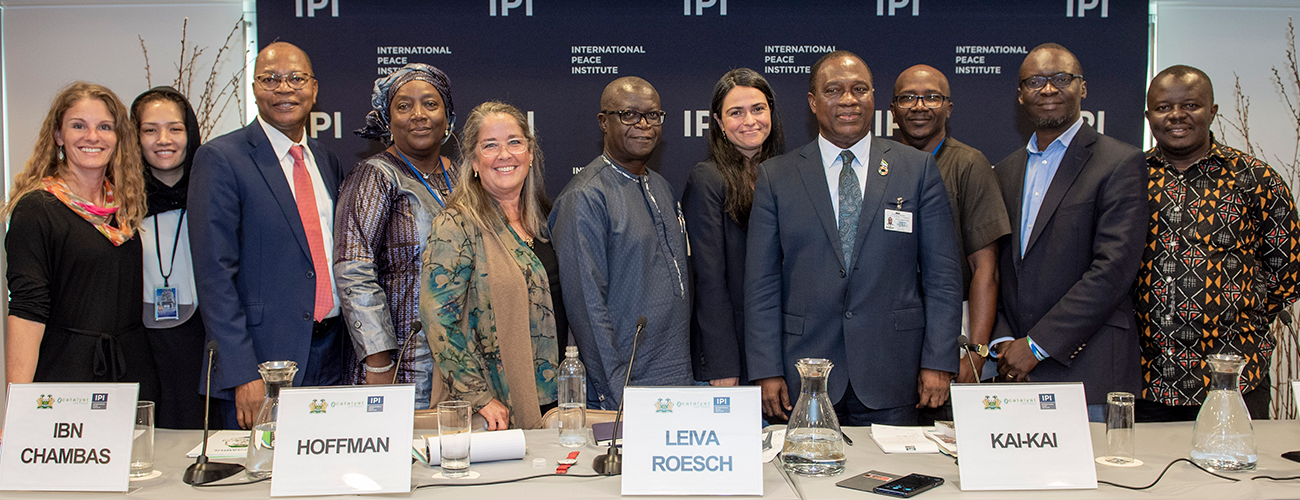Over the past 12 years, the Sierra Leone civil society organization Fambul Tok, its US-based funder and partner Catalyst for Peace, and the people of the country have created an admired model infrastructure that puts people and communities at the center of peace and development. The emerging program has helped Sierra Leone build national capacity to engage villages, sections, chiefdoms, and local districts in national governance.
In a September 27th event cosponsored by IPI, the Government of Sierra Leone, and the Catalyst for Peace foundation, Libby Hoffman, founder and president of the foundation, outlined the process in an inventive manner by pouring water into a small perforated cup and watching as the liquid dribbled through the cracks. “The way the international aid community works is that it pours in resources to that cup, but the cup is broken, meaning the community itself is broken,” she said.
Aid givers usually take this to mean that the community needs more resources, Ms. Hoffman explained, “so they pour more resources in, sometimes even in a way that widens the cracks in the cup.” In actual fact, she said, “we need to repair the cup so it can hold and use resources and even tap into their own local resources better so that their cup becomes a well. Repairing the cup is the core of our process.”
To make her final point, she held up a collection of bowls, one inside the other. “This is governance, but led by local leaders,” she said. “This is not bottom-up versus top-down, we don’t use that language. We call this an inside-out approach, instead of outside–in. They are together and functioning as a whole system, which can work in both directions.”
Sierra Leone has suffered through 10 years of civil war, an Ebola virus epidemic, political and electoral unrest, and repeated natural disasters including mudslides caused by a combination of human exploitation of the land and climate change. Despite this disruptive recent history, “Sierra Leone has come out of this a strong and resilient country, with a strong common sense of purpose not to repeat the mistakes of the past,” said Francess Piagie Alghali, the Minister of State for the Office of the Vice President. “The Fambul Tok framework comes out of a desire of Sierra Leoneans to maintain peace and national cohesion after the tribulations and ensure that communities have a voice in their own development.”
Pointing out the linkages between the Sierra Leone program and the United Nations Sustainable Development Goals (SDGs), IPI President Terje Rød-Larsen said, “The unique experience of Sierra Leone can shed light on how to accelerate the SDGs through a people-centered approach… and provides a useful example for West African nations and beyond.”
IPI Senior Fellow Jimena Leiva Roesch, a key negotiator of the 2015 UN Sustainable Development Goals (SDGs), recalled that with the adoption of the SDGs “we were very explicit on what we wanted, and who wanted to do it, but we left out the how, how we are going to do it, and that is the most important part, and Sierra Leone is telling us how we can accelerate action on the 2030 agenda.”
Tamba Lamina, Minister of Local Government and Rural Development, recalled that local councils were introduced to Sierra Leone in 2004 with the purpose of promoting good governance and accountability, but the responsibilities assigned to them did not produce the desired sense of local ownership. “Local councils had not yet grasped the issue of community ownership and people’s ownership, and that’s exactly what this framework brings to the table,” he said.
John Caulker, the Founder and Executive Director of Fambul Tok (Family Talk) International, said the idea for the effort began as a way to avoid the mistakes made during the post war reconstruction of Sierra Leone and the country’s recovery from the Ebola epidemic where most project planning came from the capital of Freetown or abroad. “Fambul Tok is a community-owned organization so we went back to the community, to the very village where Ebola broke out, and we brought community members together with the simple question: what was your experience with Ebola? How can we prevent such mistakes? How can we better address these problems?
“It was clear that people already know what they want. They have the strategy and they have the resources—what was not clear was linking these development programs with the national process.”
Mohamed Ibn Chambas, Special Representative of the Secretary-General and Head of the Office for West Africa and the Sahel (UNOWAS), commended Sierra Leone for its commitment to “reducing gender inequality and improving social protection.” He singled out programs that curb child marriage and teenage pregnancy, combat gender-based violence, and promote free quality education, particularly for young girls.
Francis M. Kai Kai, Minister of Planning and Economic Development, acknowledged disappointment at the slow pace of the overall implementation of the SDGs but said that Sierra Leone had learned valuable lessons from its crisis-ridden past. “In every crisis, there is an opportunity,” he said, “and for post-conflict Sierra Leone, crisis response and recovery strategies have left us with sustainable development models to help transform our nation going forward.” He said the task now for achieving the country’s national development objectives was improving coordination. “We need to strengthen coordination and reporting at all levels,” he said.








